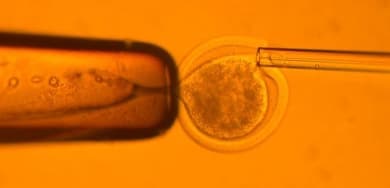Germany liberalizes stem cell research

The German parliament the Bundestag voted on Friday morning to liberalize controversial stem cell research.
Until now, researchers were only allowed to use stem cells acquired from abroad before January 1, 2002. Now scientists will be allowed to access cells collected before May 1, 2007.
Many scientists support the liberalization because they say older cells are inadequate for cutting edge research. German Chancellor Angela Merkel, a physicist by training, has also backed the legislation changing the cell harvest date.
Stem cell research has given rise to heated debate in Germany because of sensitivity to eugenics experiments carried out by the Nazis during the Second World War. The Catholic church opposes stem cell research and warned the government not to change the cut-off date.
Director of the Max Planck Institute for molecular biomedicine Hans Schöler told news agency DPA he was happy with the vote. "Of course a total abolishment of the cut-off date would have been wonderful, but to put it pragmatically, now we can continue working," said Schöler, who plans to apply for the newly available stem cells right away.
But Archbishop Robert Zollitsch, head of German Catholics, said that "killing embryos will never be justifiable." His view was backed by Norbert Lammert, the president of the Bundestag, or lower chamber of parliament, who said: "There are limits, even for research."
President of the Central Committee of German Catholics (ZdK) Hans Joachim Meyer said in a statement on Friday that he was deeply disappointed with the decision.
"We warned of this decision because we believe it is not justified, and sends the wrong message in light of the preservation of life in the field of biomedical research," Meyer said. "Now it's time for us to make sure the cut-off date ruling doesn't become a 'shifting sand dune,' because it will increase the lust for using human embryos for general research purposes."
dpa/afp
Comments
See Also
Until now, researchers were only allowed to use stem cells acquired from abroad before January 1, 2002. Now scientists will be allowed to access cells collected before May 1, 2007.
Many scientists support the liberalization because they say older cells are inadequate for cutting edge research. German Chancellor Angela Merkel, a physicist by training, has also backed the legislation changing the cell harvest date.
Stem cell research has given rise to heated debate in Germany because of sensitivity to eugenics experiments carried out by the Nazis during the Second World War. The Catholic church opposes stem cell research and warned the government not to change the cut-off date.
Director of the Max Planck Institute for molecular biomedicine Hans Schöler told news agency DPA he was happy with the vote. "Of course a total abolishment of the cut-off date would have been wonderful, but to put it pragmatically, now we can continue working," said Schöler, who plans to apply for the newly available stem cells right away.
But Archbishop Robert Zollitsch, head of German Catholics, said that "killing embryos will never be justifiable." His view was backed by Norbert Lammert, the president of the Bundestag, or lower chamber of parliament, who said: "There are limits, even for research."
President of the Central Committee of German Catholics (ZdK) Hans Joachim Meyer said in a statement on Friday that he was deeply disappointed with the decision.
"We warned of this decision because we believe it is not justified, and sends the wrong message in light of the preservation of life in the field of biomedical research," Meyer said. "Now it's time for us to make sure the cut-off date ruling doesn't become a 'shifting sand dune,' because it will increase the lust for using human embryos for general research purposes."
dpa/afp
Join the conversation in our comments section below. Share your own views and experience and if you have a question or suggestion for our journalists then email us at [email protected].
Please keep comments civil, constructive and on topic – and make sure to read our terms of use before getting involved.
Please log in here to leave a comment.